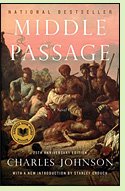Middle Passage
by Charles Johnson
Reviewed by Margaret Tomlinson

Middle Passage is a fast-paced, absorbing sea story full of suspense and vivid characterizations. It won, and deserved, a National Book Award in 1990, the year it was first published. After a first chapter on land in exotic early-nineteenth-century New Orleans, the novel takes place aboard a slave ship.
Unofficial crew member Rutherford Calhoun, a former slave himself, is in a unique position to mediate between the otherwise white crew and the group of high-value Africans forced aboard in the Gulf of Guinea along with a mysterious crate holding cargo whose nature the captain will not reveal, except to warn the crew it is highly dangerous and even more valuable than the slaves.
The sailors are a motley crew. The first mate is "tall and straight as a ship's door, a gentleman from his unwrinkled shirt right down to the spit-polished boots that reflected back winces and deadeyes on deck. His skin was white as wax, which made him seem like nothing less than a tightly wound toy soldier." The cook, a drunkard, had "stepped off a mizzentop during his last trip, having forgotten where he was, fallen twenty feet, and miraculously landed on his right foot. Which shattered.... He was slow, useless except in the cookroom, with lumps and udders in his face from liquor; a liability at sea, but what sailor could not see in Josiah Squibb his own portrait in years to come if Providence turned her back?" To quote from the captain's description would be a spoiler, but he's every bit as colorful and dangerous as his crew.
Middle Passage has been compared to Herman Melville's Moby-Dick. It's similarly masterful in the way it evokes nineteenth-century sailors coping with the raw hazards of weather, ocean and their fellow sailors. Its compact length and unremitting suspense, though, will keep many readers hooked who bogged down in parts of Moby-Dick. A great read. (1990, 207 pages in the 2015 Scribner trade paper edition)
More about Middle Passage at Amazon.comOther novels about nineteenth-century sea voyages:
Moby-Dick; or, The Whale by Herman Melville (1851), about a man who joins the crew of a whaling ship and discovers its captain is obsessed with hunting down the white whale he lost his leg to on a previous voyage. More info
Sacred Hunger by Barry Unsworth (1992), about the captain of a slave ship on a disastrous voyage. More info
The Ghost of the Mary Celeste by Valerie Martin (2014), about two young women in a seafaring family haunted by death, the mysterious disappearance of everyone aboard the ship Mary Celeste, and the young Arthur Conan Doyle, who wrote a short story based on the tragedy. See review or more info at Amazon.com
Nonfiction about nineteenth-century slave ships:
The Slave Ship: A Human History by Marcus Rediker (2007). More info
The Creole Mutiny: A Tale of Revolt Aboard a Slave Ship by George Hendrick and Willene Hendrick (2003). More info
The Logbooks: Connecticut's Slave Ships and Human Memory by Anne Farrow (2014). More info
Online:
Aboard a Slave Ship at the Eyewitness to History website
Back to Novels of Nineteenth-Century America
Back to Directory of Book Reviews